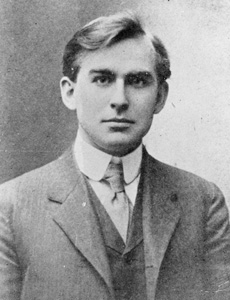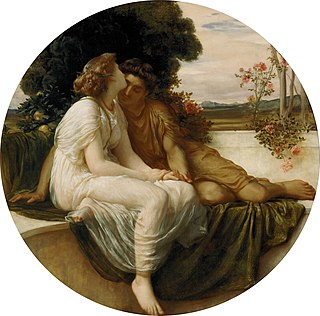
Gaius Valerius Catullus, known as Catullus, was a Latin neoteric poet of the late Roman Republic. His surviving works remain widely read due to their popularity as teaching tools and because of their personal or sexually explicit themes.

Silphium is an unidentified plant that was used in classical antiquity as a seasoning, perfume, aphrodisiac, and medicine.
Gaius Licinius Macer Calvus was an orator and poet of ancient Rome.

Irrumatio is a form of oral sex in which someone thrusts their penis into another person's mouth, in contrast to fellatio where the penis is being actively orally excited by a fellator. The difference lies mainly in which party takes the active part. By extension, irrumatio can also refer to the sexual technique of thrusting the penis between the thighs of a partner.
Puella Mea is a poem by E. E. Cummings. It is notable as his longest poem, at 290 lines. The title is Latin and translates as "My Girl", referring to Elaine Orr Thayer, his first wife, and the mother of his only child, Nancy Thayer Andrews. Von Abele considers the poem to be a departure point for the poet from the "witty romanticism" of his early works.

Catullus 64 is an epyllion or "little epic" poem written by Latin poet Catullus. Catullus' longest poem, it retains his famed linguistic witticisms while employing an appropriately epic tone.

Catullus 1 is traditionally arranged first among the poems of the Roman poet Catullus, though it was not necessarily the first poem that he wrote. It is dedicated to Cornelius Nepos, a historian and minor poet, though some consider Catullus's praise of Cornelius's history of the Italians to have been sarcastic.

Catullus 3 is a poem by Roman poet Gaius Valerius Catullus that laments the death of a pet sparrow (passer) for which an unnamed girl (puella), possibly Catullus' lover Lesbia, had an affection. Written in hendecasyllabic meter, it is considered to be one of the most famous of Latin poems.

Catullus 2 is a poem by Roman poet Gaius Valerius Catullus (c. 84 – c. 54 BCE) that describes the affectionate relationship between an unnamed puella ('girl', possibly Catullus' lover, Lesbia), and her pet sparrow. As scholar and poet John Swinnerton Phillimore has noted, "The charm of this poem, blurred as it is by a corrupt manuscript tradition, has made it one of the most famous in Catullus' book." The meter of this poem is hendecasyllabic, a common form in Catullus' poetry.
Catullus 101 is an elegiac poem written by the Roman poet Gaius Valerius Catullus. It is addressed to Catullus' dead brother or, strictly speaking, to the "mute ashes" which are the only remaining evidence of his brother's body.

Catullus 4 is a poem by the ancient Roman writer Catullus. The poem concerns the retirement of a well-traveled ship. Catullus draws a strong analogy with human aging, rendering the boat as a person that flies and speaks, with palms and purpose.

Catullus 12 is a poem by the Roman poet Catullus. In it, he chides Asinius Marrucinus for stealing one of his napkins, calling it uncouth and noting the disapproval of his brother, Pollio. Note the reversal of the praenomen and nomen in the first line. While "Asini Marrucine" could be translated simply as "Asinius Marrucinus", the inverted word order introduces the alternative meaning "Marrucinus [son] of a jackass". Napkins in Ancient Rome were handmade and therefore far more valuable than they are today; also, Catullus has a sentimental attachment to the napkins, as they were a gift from two close friends, Fabullus and Veranius. In comparison to Catullus's other invective poetry, this is relatively light: the main point of the poem could be to praise Pollio rather than to chide Marrucinus.

A Latin Dictionary is a popular English-language lexicographical work of the Latin language, published by Harper and Brothers of New York in 1879 and printed simultaneously in the United Kingdom by Oxford University Press.

Catullus 5 is a passionate ode to Lesbia and one of the most famous poems by Catullus. The poem encourages lovers to scorn the snide comments of others, and to live only for each other, since life is brief and death brings a night of perpetual sleep. This poem has been translated and imitated many times.

Tenney Frank was a prominent American ancient historian and classical scholar. He studied many aspects of Ancient Rome, for instance its economy, imperialism, demographics and epigraphy.
Catullus 16 or Carmen 16 is a poem by Gaius Valerius Catullus. The poem, written in a hendecasyllabic (11-syllable) meter, was considered to be so sexually explicit following its rediscovery in the following centuries that a full English translation was not published until the 20th century. The first line, Pēdīcābo ego vōs et irrumābō, sometimes used as a title, has been called "one of the filthiest expressions ever written in Latin—or in any other language".

Catullus 45 is a poem by the Roman poet Catullus, describing the love between a fictional couple called Acme and Septimius. It is an over-the-top love poem that is ever so slightly tongue-in-cheek.

Sir Roger Aubrey Baskerville Mynors was an English classicist and medievalist who held the senior chairs of Latin at the universities of Oxford and Cambridge. A textual critic, he was an expert in the study of manuscripts and their role in the reconstruction of classical texts.

Medicamina Faciei Femineae is a didactic poem written in elegiac couplets by the Roman poet Ovid. In the hundred extant verses, Ovid defends the use of cosmetics by Roman women and provides five recipes for facial treatments. Other writers at the time condemned women's usage of cosmetics.














